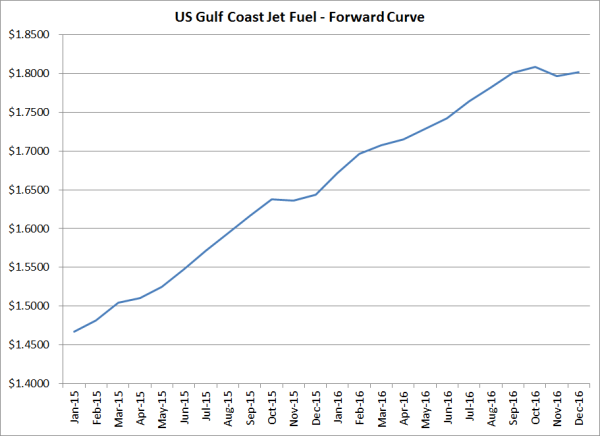Airlines Alter Fuel Hedging Strategies for Low Price Environment
As crude oil and jet fuel prices continue to decline, many airlines are adapting their fuel hedging strategies to account for the current, lower price environment. On one hand, some airlines are taking a more aggressive stance or beginning to hedge their fuel price exposure for the first time in company history. Others are taking a step back and either reducing the scale of their hedging programs or eliminating them completely. Some are also taking an entirely different different approach, choosing to sell their existing positions (and realize the losses) in order to enter into new positions at lower prices.

In the first group, companies such as Thai Airways, are scaling up their hedging programs to take advantage of lower prices. According to a recent Reuters article, Thai Airways, "Plans to fully hedge its jet fuel costs to help minimise the impact of the drop in value of its fuel inventory after declines in global crude oil prices...The flag carrier has already hedged 73 percent of fuel purchases pegged to an average price of almost $90 a barrel of jet fuel until the end of this year, and plans to extend that to 100 percent for 2015." The article goes on to say, "Thai Airways also plans to extend the period for which it has 73 percent hedging cover to 2016 at the lowest possible price."
In the second camp are companies like Etihad Airways, which has stated that they are no longer adding new positions. In a recent article published by The National, Etihad CEO James Hogan is quoted as saying, "We hedge on a three-year rolling programme, so the first year is typically about 80 per cent, the second year is 50 per cent and the third year is at 25 per cent. We have collar targets and we’re comfortable where it is at the moment. But now we’ve stopped hedging because fuel has come down.”
In the third group are the likes of United Airlines, which have liquidated some of their higher priced positions to take advantage of lower prices. According to Reuters, "n">United Airlines has paid a premium to dump old losing bets on higher oil prices, and is reviewing its strategy for insulating itself from oil market volatility, in a sign of how some airlines' efforts to hedge their fuel costs have backfired." Noting Southwest Airlines's famous, long-term hedges, the article further indicates that United has discussed whether prices declined enough for them to consider entering new positions which could extend out several years.
As we've noted in numerous other posts, for example, Are Airlines Changing Fuel Hedging Strategies in 2014 and Beyond, there isn't a "one size fits all" approach to hedging which works for all companies. As the examples highlighted above indicate, the best fuel hedging strategy for an airline, or any company for that matter, is the strategy(s) which best suits their risk tolerance, hedging objectives, financial position, etc. While many hedging strategies might appear to provide an ideal solution, the details are often much more complex.
In the current, lower price environment, one could argue that many airlines would be well served by buying swaps, costless collars, call options or some combination of the three. However, all of these strategies contain obstacles of some sort. In the case of swaps and collars, both generally require a line of credit or a pledge of collateral and are also subject to margin calls if prices continue to decline. While obtaining a line of credit, posting collateral or meeting margin calls might be easy for some airlines, it certainly isn't the case for all airlines. In the case of call options, many airlines are unable or unwilling to spend cash to pay for option premiums.
In recent weeks and months we've had numerous discussions with airlines across the world who are trying to determine if, when and/or how they should hedge their fuel price risk in the "new" price environment. And nearly all of these discussions result in conclusion similar to the following: the "best" hedging program for any company, in nearly any price environment, is a program which is based on the company's hedging goals, risk tolerance, financial position, etc.
On a related note, Mike Corley and Paul Horsnell of Standard Chartered will be leading a session on airline fuel hedging at the Airline Economics conference next week in Dublin.
